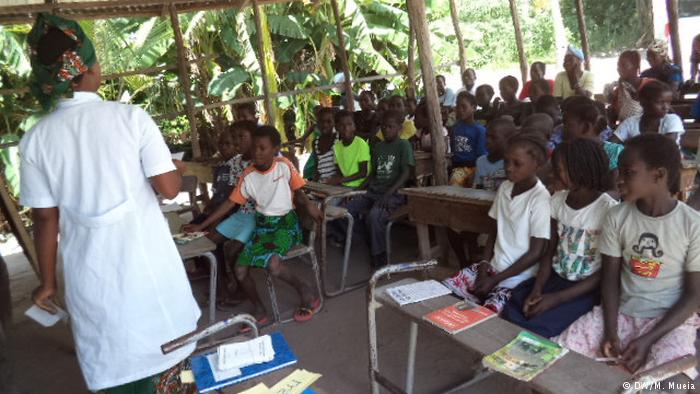Mozambique: New water pumping station will benefit 72,000 people in Maputo
Mozambique: Government pledges on Health and Education fall on deaf ears

DW /Primary school in the central province of Zambézia, Mozambique
Mozambique’s Centre for Public Integrity (CIP) says that the government has not protected expenditure in the social sectors as promised. The NGO, which has analysed the Second Budgetary Execution Report for 2016, has found higher expenditure in some sectors without any justification being forthcoming.
But not everything is critical. The Centre, which works for transparency and good governance, recognises the government’s efforts at rigour in public accounts. DW Africa quizzed the CIP’s Jorge Matine on the subject.
DW Africa: Is government in default or is this just a consequence of the hidden debts?
Jorge Matine (JM): It’s both. In recent years, in relation to what is budgeted, the government has often promised more investment in the social sectors. But the difference is not great, as happened this time. And what we say is that there was a lot of emphasis during the approval of the 2016 budget and during the review, and the government promised the Assembly of the Republic in a public debate that any change it made would not affect the social sectors. The Government said publicly that in any possible change or execution constraint, it would do everything to ensure that the social sectors were protected.

DW Africa: But again, have the hidden debts and low state revenues in recent years been influential?
JM: Yes. As you can see, the main impact was on investment, which has great donor participation. The fact that donors have frozen direct support to the budget and some projects at ministry level has greatly affected spending in the social sectors. It is true that this is a consequence of the discovery of the hidden debts.
DW Africa: What consequences of this low social sector investment has the CIP identified?
JM: In health sector investment, with internal resources, there was a cut of 38.2 percent. So if in sectors such as health and education there are cuts of this magnitude we can see that it will have a very big impact on the functioning of the sector. In the area of infrastructure, for example, there was a cut of 27 percent. This is a lot for sectors that are by their nature very weak and have a very direct impact on the lives of citizens. In the health sector we are talking the health network for rural and peri-urban population – and education as well. We are talking about sectors that will have an impact on lower income populations, who are actually highly vulnerable, economically.
DW Africa: You also find that the government has accumulated money in a state account, but the report does not mention this account. Has the CIP already asked parliament to question the government on this matter?
JM: Yes. Since last year we have published papers on balances in other accounts and we did this in our analysis of the General State Account and of the Budget Execution Report, where we say that there are balances with high resources, and we do not know why they have these balances.
We also see that the Court of Accounts, the Administrative Court (TA), has asked the government to explain the high balances, but has received no reason from the government. We are in a situation where even those who are legally mandated to audit the state’s accounts are receiving insufficient information about the balances. And the Assembly of the Republic, in the interpellation, has not yet been answered on what is happening with the balances.
DW Africa: Did the CIP find any positive aspect of the 2016 state budget?
JM: Yes. We have seen that the government is really trying to respond with rigour to the demands made, but at the same time we feel it does so by violating certain norms, so it also reduces the level of trust. The government has taken measures to restrain spending in the social sectors, but at the same time it has high balances elsewhere without explaining why this is so.












Leave a Reply
Be the First to Comment!
You must be logged in to post a comment.
You must be logged in to post a comment.